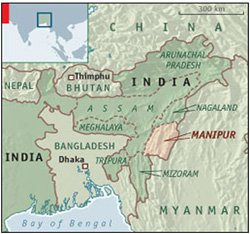Fact:
- India shares 1,643-km long border with Myanmar that passes through four states of Arunachal Pradesh, Nagaland, Manipur and Mizoram.
What is Free movement regime (FMR)?
- The formation of Myanmar as a separate State in 1935 and decolonisation of the sub-continent in 1947 divided ethnic communities living along the Indo-Myanmar border.
- These communities, particularly Nagas, found the newly created boundary to be inconsistent with the traditional limits of the region they inhabited. And they felt a deep sense of insecurity because they became relegated to the status of ethnic minorities on both sides of the border.
- To address their concerns and enable greater interaction among them, the Indian and Myanmarese governments established the Free Movement Regime (FMR), which allowed Nagas to travel 16 kilometres across the border on either side without any visa requirements.
- Both countries are intend to put common system in place to append India’s concerns.
Why FMP is causing issues now?
Free movement regime is being misused by militants and trans-border criminals who smuggle weapons, contraband goods and fake Indian currency notes. Taking advantage of the free-movement regime, occasionally they enter India, commit crimes and escape to their relatively safer hideouts.
What government is doing in this regard?
- The Union Home Ministry has constituted a committee to examine methods to curb the misuse of free movement along the Myanmar border.
- In January 2018, Union Cabinet had approved agreement (Memorandum of Understanding) between India and Myanmar on land border crossing to enhance economic interaction between people of two countries.
- To give it shape, Central Government had asked four border states with Myanmar to distribute “border pass” to all the residents living within 16 km from the border.
- The agreement has been deferred twice in the past seven months

Significance of Agreement:
- The agreement will facilitate movement of people on basis of valid passports and visas which will enhance economic and social interaction between two countries.
- It will facilitate regulation and harmonization of already existing free movement rights for people ordinarily residing in border areas of both countries.
- It will also give boost to economy of North East and leverage geographical connections with Myanmar to boost trade and people to people ties.
- It will also safeguard traditional rights of largely tribal communities residing along border which are accustomed to free movement across land border.
Border Pass Proposal
There are over 250 villages with over 300,000 people living within 10 km of border who frequently cross it through 150 small and large, formal and informal, border crossings. As per proposal, there will be no restrictions on movement of people across borders. But, domiciles across the border will be allotted border passes and those going across for agriculture, work or to meet relatives need to carry pass all times.
What is the response of Myanmar Government?
- Myanmar has indefinitely deferred signing agreement with India to streamline free movement of people within 16 km along open border between two countries.
- It has cited domestic compulsions and has asked for more time for the agreement to be sealed.